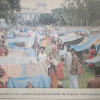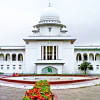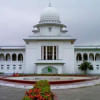Freedom of press not absolute at all times
The Supreme Court yesterday observed that the freedom of the press is not “absolute, unlimited and unfettered at all times and in all circumstances as would lead to disorder and anarchy”.
“…there is no separate guarantee of the freedom of the press. The freedom of the press is not higher than the ordinary citizen. It is subject to the limitations,” it said.
The apex court made the observations, releasing its full judgment in a case against the daily Janakantha.
It, however, said the freedom of the press cannot be curtailed by executive orders or administrative instructions which lack the sanction of law.
In the judgment, the court also explained the elements and categories of contempt of court.
Publication or other acts scandalising or lowering the authority of the court or interfering with judicial proceedings or administration of justice are contempt of court, according to the SC.
It said prejudice to or interference with the due course of any judicial proceeding, interference or obstruction of the administration of justice in any other manner, interference with the court's officers, parties and witnesses, abuse of process of the court and disobedience of an order of the court are among the categories of contempt of court.
“The first category is scandalising the court or a judge. The second is the interference with the administration of justice. The third is disobedience of an order of the court,” said the SC.
“Another category is writings which are calculated to obstruct or interfere with the due course of justice which is also contempt. Any insinuation to a judge which undermines the authority of the court is another type of contempt,” the top court said in the 182-page judgment.
“Another type of contempt is scurrilous abuse of a judge or court or attacks on the personal character of a judge,” it said.
About sanction of law with regard to curtailing of the freedom of the press, the SC said, “The law must fall squarely within one or more heads of restrictions specified in article 39 namely, (a) security of the state, (b) friendly relations with foreign states, (c) public order, (d) decency or morality, (e) contempt of court, and (f) defamation or incitement to an offence.”
The court said restriction on freedom of expression cannot be imposed on omnibus grounds as “in the interest of the general public”.
“The restriction must be reasonable. In other words, it must not be excessive or disproportionate. The procedure and the manner of imposition of the restriction also must be just, fair, and reasonable,” it said.
The media may play a positive role in the administration of justice, and it has played such role, according to the SC.
On August 13, the apex court sentenced the editor and publisher of the daily Janakantha and its executive editor to confinement in the courtroom for over three hours for contempt of court by publishing an article relating to war crimes convict Salauddin Quader Chowdhury, who was executed on November 22.
A six-member bench of the apex court headed by Chief Justice Surendra Kumar Sinha also fined the two journalists Tk 10,000 each.
“All elements of grave contempt of court are present in the impugned article,” the SC had said about the write-up published in the daily on July 16.
Executive Editor Swadesh Roy wrote the piece headlined “Saka Paribarer Totporota! Palabar Path Kome Gechhe (Lobbying by Salauddin Quader's family! Escape route getting narrowed).
In the full judgment released yesterday, the judges said, “We were astonished and bewildered on reading the remarks and comments made in the impugned article. We cannot believe that a sensible writer can make such comments.”
“The writer cannot publish the same [article] because this is completely internal matter of the administration of justice that a puisne judge had discussed withthe chief justice over two pending cases, expressing the desire to be included in the bench.
“The chief justice has exclusive power to constitute any bench for hearing any matter before it and the High Court Division, and the chief justice being the guardian of the judiciary cautiously constitutes the benches. It is one of the crucial jobs for a chief justice,” the judges said.
Chief Justice Surendra Kumar Sinha has written the 182-page judgment. Five other judges have agreed with him.
The five other judges are Justice Md Abdul Wahhab Miah, Justice Nazmun Ara Sultana, Justice Syed Mahmud Hossain, Justice Muhammad Imman Ali and Justice Hasan Foez Siddique.

 For all latest news, follow The Daily Star's Google News channel.
For all latest news, follow The Daily Star's Google News channel. 








Comments